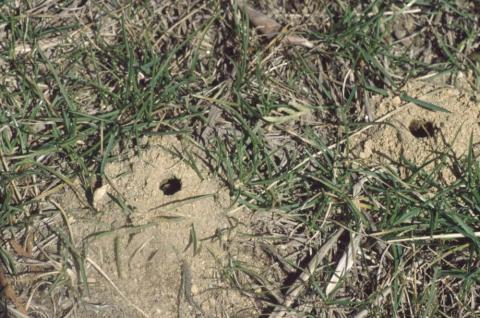Should I be concerned about ground nesting bees in my yard?

There are many different species of ground nesting bees in New Hampshire, none of which are particularly aggressive. Unlike honeybees that live in communal hives, ground nesting bees are solitary, meaning that each female bee will create her own nest to lay her eggs in. The evidence of ground nesting bee activity is usually most apparent in early spring. The nests are often quite obvious, appearing on the soil surface as small piles of dirt with single large holes in the center. Although ground nesting bees are equipped to sting, they will only do so under extreme provocation. In essence, their presence is more of a nuisance than a real threat.
Ground nesting bees like to nest in areas with sandy, well-drained soil and limited vegetation. They are most often considered an issue in sparse lawns and gardens with a considerable amount of bare ground. Sometimes it may appear that there is a colony of bees nesting in a lawn, but in reality, individual bees have been attracted to the area by the favorable soil conditions. If you don’t want them nesting in your landscape, the most effective way of discouraging them is to change the soil conditions. Mulching the surface of a garden or increasing lawn density with proper fertilizing, watering, and seeding are effective ways of encouraging ground nesting bee species to find different nesting locations.
Using chemicals to kill ground nesting bees is not recommended. Though wasp and hornet sprays directed into burrows will kill the individuals, more will be back to nest again next season unless soil conditions change. Furthermore, ground nesting bees play an important ecological role which includes the pollination of both crop plants and wildflowers. Some ground nesting bee species have significance in the garden as native pollinators of blueberries and apples. If you’re interested in boosting native pollinator populations, consider leaving some bare soil in a corner of your yard just for the bees.
Got questions? The Ask UNH Extension Infoline offers practical help finding answers for your home, yard, and garden questions. Call toll free at 1-877-398-4769, Monday to Friday, 9 a.m. to 2 p.m., or e-mail us at answers@unh.edu.
Related Resource(s)
Do you love learning about stuff like this?
SUBSCRIBE TO Granite State Gardening newsletter
Got questions? The UNH Extension Yard and Garden Infoline offers practical help finding answers for your yard and garden questions.
Call toll free at 1-877-398-4769, Monday to Friday, 9 a.m. to 2 p.m., or fill out webform.
